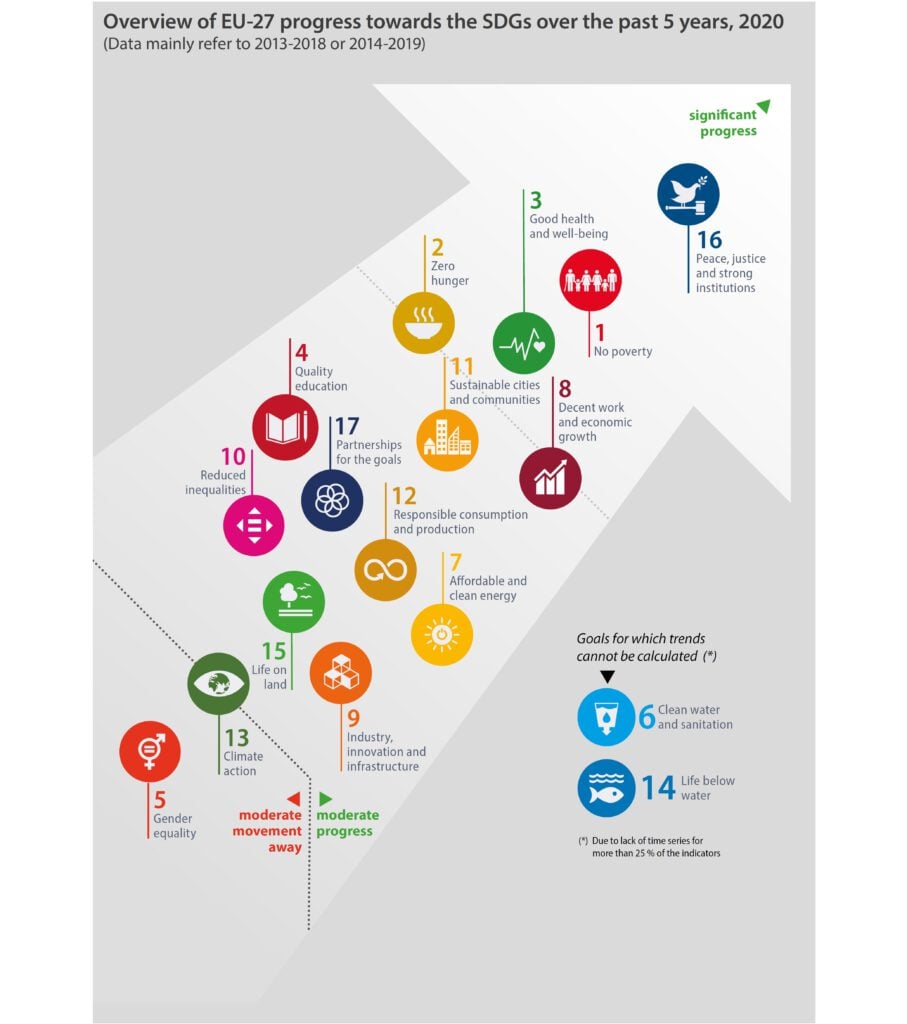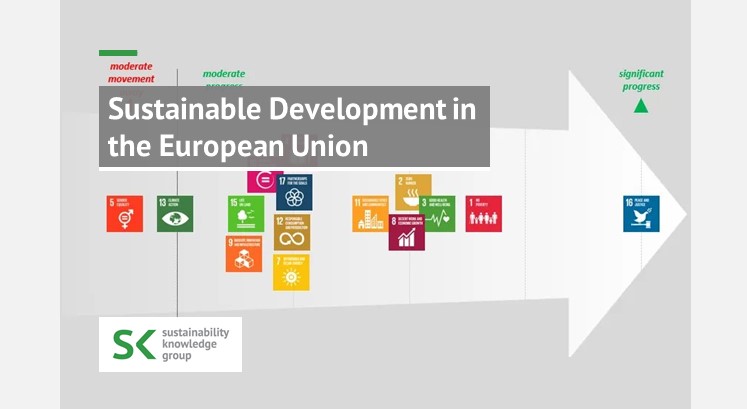The 2030 Agenda for Sustainable Development and the 17 Sustainable Development Goals (SDGs) have driven global efforts to achieve Sustainable Development. The European Union (EU) is committed to making maximum progress towards the SDGs for the 2030 Agenda implementation. The European Commission is working to integrate the SDGs into the European Semester of economic policy coordination.
On June 22, 2020, the Statistical Office of the European Union (Eurostat) released its fourth report, entitled “Sustainable development in the European Union – Monitoring report on progress towards the SDGs in an EU context (2020 edition)“.

The report provides a detailed description of the EU’s progress towards the 17 SDGs in the EU context. It monitors progress over the past five “short-term” years and the past fifteen “long-term” years while providing data. The report also includes the state of progress of each country towards the SDGs and the worst and best performing among the countries.
The analysis of the data in this report relied on the set of indicators developed in cooperation with a large number of stakeholders. The set of indicators includes approximately 100 indicators, is organized along the 17 SDGs, and focuses on the relevant SDGs from an EU perspective. It allows the EU’s relevant SDG indicators to focus on monitoring the EU’s policies and on related phenomena in particular in the European context.
How has the EU advanced towards the SDGs?
The report notes that the 2020 evaluation is not fully comparable with previous releases, due to changes in indicators for some of the targets, and because the EU no longer includes the United Kingdom.
On average, based on the data available, over the past five years, the EU has made significant progress toward some SDGs, and progress on some SDGs has been faster than others. The biggest progress made was in the SDG 16 (Peace, Justice and Strong Institution), followed by SDG 1 (No Poverty) and SDG 3 (Good Health and Well-being). This progress in the previous goals helped to reinforce SDG 11 (Sustainable Cities and Communities) and increase the quality of life in societies and cities. The report also reflected of the continued improvement in the UN economy on the labor market and the SDG 8 of (Decent Work and Economic Growth).
In contrast, the goals dealing with environmental issues, SDG 7 (Affordable and Clean Energy), SDG 13 (Climate Action), SDG 12 (Responsible Consumption and Production), and SDG 15 (Life on Land) indicate slow progress or lack of development of the EU over the past few years overall. The report also reflects the slow progress towards SDG 5 (Gender Equality) and reducing inequality SDG 10 (Reduced Inequalities). The report shows that the gap widens between women and men in obtaining education and in the labor market.
As for SDG 6 (Clean Water and Sanitation) and SDG14 (Life below Water), the progress of UN trends have not been calculated due to insufficient data.
The report presents the state of play in the EU and its member states until 2019, the year before the introduction of COVID-19 containment measures on a large scale by EU member states. Any adverse effects on the overall progress of the EU due to the COVID-19 on the progress towards achieving the SDGs is expected to be part of the next report, to be released in 2021. .
This year’s report introduces a new chapter, Chapter 18, on each member state’s progress towards the SDGs, and shows the best and worst performers in the EU.
In general, the EU member states are making progress toward the SDGs and the countries closest to achieving the SDGs include Denmark and Ireland, while countries like Latvia and Romania are still catching up.
Eurostat released the report just in time for the UN High-Level Political Forum (HLPF), a central platform for global follow-up of the 2030 Agenda and SDGs, scheduled to take place on 7th July 2020. This report will give Member States an overview at the progress made up to the HLPF session. Identifying the most pressing sustainability challenges and critically studying performance is essential for the EU to ensure a sustainable Europe as part of a sustainable world.
Photo by SDG Watch Europe

